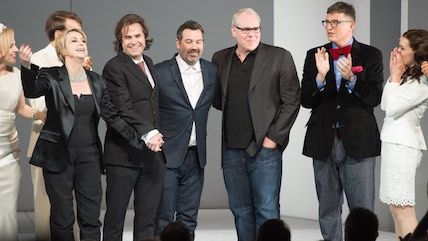Bret Easton Ellis Unloads on Social Justice Warriors, 'Authoritarian Language Police'
'Oh, little snowflakes, when did you all become grandmothers and society matrons, clutching your pearls in horror?'


Bret Easton Ellis—author of American Psycho and The Rules of Attraction—is not a fan of lefty outrage culture.
"Why is it once again that I feel the well-intentioned young liberal self-proclaimed feminist left has become so oversensitive about everything that we have entered into what is really an authoritarian cultural moment?" he said at the end of a 15-minute monologue.
The subject of Ellis's ire? L.A. Weekly recently ran an article about musician Sky Ferreira that focused on why her sex appeal "is what pop music needs right now." The author, male music critic Art Tavana, was roundly criticized by websites like Jezebel and Teen Vogue. The piece reduced her to an object, ignoring her music entirely, they argued.
"Today a boring man was allowed to publish a think piece about not-boring musician Sky Ferreira that began by discussing her "killer tits," as seen on her last album cover, and comparing her cup size to Madonna's (in a deeply uninspired collation he carried out 'til the very end)," lamented Jezebel's Julianne Escobedo Shepherd.
Taking the extreme opposite view: Bret Easton Ellis.
"Oh, little snowflakes, when did you all become grandmothers and society matrons, clutching your pearls in horror at someone who has an opinion about something, a way of expressing themselves that's not the mirror image of yours, you sniveling little weak-ass narcissists?" he said during a recent episode of his podcast.
A full transcript of his remarks is available here, courtesy of The Independent.
Ellis thinks there's a double standard going on here. No one complains when the artist being sexualized is male, he says.
He might have a point. As I write this, the internet is experiencing a collective freakout over the nude photos of actor Orlando Bloom—not because this represents a creepy and disgusting invasion of his privacy, but because, well, he looks good in them. A lot of people want to see more, and aren't afraid to admit it.
"The photos, taken in Sardinia, Italy, are censored by the Curse of the Black Box," complained Mashable. "But you can always count on the fine people of the internet to using their imaginations to determine whether Bloom's packing a hobbit or an orc."
When it comes to celebrity photo leaks, hypocrisy abounds. When Jennifer Lawrence's nudes were leaked, Jezebel wrote, "You have got to be fucking kidding me," and "no one and nothing is safe." When Justin Bieber's nudes appeared on social media, Jezebel made jokes about it: "How to Talk to Your Significant Other About Justin Bieber's Big Dick," was the headline. Admittedly, these things are not exactly the same: Orlando and Bieber were naked in public or semi-public areas, whereas Lawrence had her phone hacked.
Ferreira, the subject of the L.A. Weekly piece, appears nude, by choice, on the cover of her album. Says Ellis:
In our society, social justice warriors always prefer women to be victims. In all of these cases, from Jezebel to Flavorwire to Teen Vogue, they all succeeded in recasting Ferreira as a victim of something, reinforcing her supposed victimisation. This is the usual hall of mirrors loop they find themselves in when they're looking for anything to get angry with. The reality of the world is that men look at women, and men look at other men, and women look at other men, and women especially look at other women and objectify them. …
But because the little Nazis policing language have a new rulebook about how men and women should and should not express themselves about their desires, this allows Jezebel and Flavorwire to write their own childish responses, placing Sky in the delicious position of victim. But the sad ending of this story is that the LA Weekly, which edited and posted the piece, felt like they had to apologise for the piece after so much online complaining, apologise about a piece where someone was clearly writing honestly - sometimes embarrassingly so - about what was on his mind in the moment about a performer, and the way he was looking, and yes, gazing at this performer, and that was it. That is allowable.
The overreaction epidemic that is endemic in the culture, and the implicit calling for censorship by removing the piece, is what should not be allowable, and it should be called out every time SJWs ignore the First Amendment.
Of course, Ellis goes too far here. Criticizing the Tavana piece isn't actually censorship—the so-called snowflake justice warriors are engaging in free expression as well. The First Amendment is not undermined when public outcry persuades a private actor to retract a statement.
Nevertheless, it's a fascinating monologue from an interesting author. Listen here.


Show Comments (191)